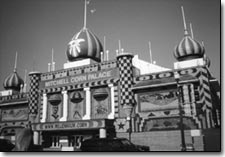Both times I've driven through South
Dakota, I've been forced against my will to make an unscheduled
stop.
The first time it
happened, my boyfriend Bryan and I had just graduated from college
in New York, and were headed west to camp in the Badlands and check
out Mt. Rushmore, among other things. But thanks to a unique form
of Midwest advertising, we ended up making an unscheduled stop at
the world's most bizarre drug store: Wall Drug.
 Here's
how it works. For about 300 miles in South Dakota on U.S.
Highway 90, every few miles there is a billboard for Wall
Drug that proclaims "5-cent coffee!" or "Free ice water!"
Because the landscape along the road is as interesting as
a calculus lecture, it's impossible to avoid reading the signs.
Initially, we laughed about the absurdity of the notion. "Do
people really fall for this blatant marketing?" I asked Bryan.
"What a sales pitch free water."
Here's
how it works. For about 300 miles in South Dakota on U.S.
Highway 90, every few miles there is a billboard for Wall
Drug that proclaims "5-cent coffee!" or "Free ice water!"
Because the landscape along the road is as interesting as
a calculus lecture, it's impossible to avoid reading the signs.
Initially, we laughed about the absurdity of the notion. "Do
people really fall for this blatant marketing?" I asked Bryan.
"What a sales pitch free water."
Several hours and
countless billboards later, we were drinking the free ice water
that began the Wall Drug legend. In 1931, Ted and Dorothy Hustead
moved to Wall, S.D., outside of Badlands National Park, and founded
Wall Drug. After about five years and few customers, Dorothy had
the idea to post signs advertising free ice water. The plan was so
successful that now Wall Drug sees up to 20,000 people each day
during the summer.
The store has expanded
to include a restaurant, arcade, shooting gallery and a
Tyrannosaurus Rex that blows steam out of its nose. The kitsch
value is the real draw, though, with silly statues, a giant
"jackalope," and photos from around the world with people holding
or pointing to Wall Drug signs.
Like a couple of
assholes, we ended up taking pictures of me climbing on a ceramic
bear with the sign "Do Not Climb on Bear," and watching the scary
dinosaur blow steam out of its nose along with a cluster of
children. After spending days in the car without any diversions, it
was actually fun.
Seven years later, Bryan
and I found ourselves on another cross-country jaunt, again through
South Dakota on Highway 90. This time, we made an unscheduled stop
at the Mitchell Corn Palace, a tourist trap that had taken a page
from the Wall Drug school of advertising since our last trip. Signs
for the palace, such as "Fabulous Ear-Chitecture" and "It's
A-Maize-Ing," elicited repeated groans from us as we drove toward
the trap.
"Whatever happens, we're
not going to that stupid place," Bryan told me. Although I
wholeheartedly agreed, later that day we were gaping at a
Russian-style palace with murals made of corn and other grains that
read www.millennium.corn. (Groan.)
The first Corn Palace
was built in 1892, partly in response to Lewis and Clark writing in
their journals that no man could ever make a living by farming in
the area. The town spent $2,976.48 to cover a small wooden
structure with crops grown in the area in order to showcase the
"rich Dakota soil," and a tradition was born.
The Corn Palace of today
takes about $100,000 and three months to redecorate every year,
when a new theme is displayed in the corn, grasses and grains of
South Dakota. Approximately 275,000 ears of corn are sawed in half
and nailed to the building each year.
Inside, the palace hosts
a corn-themed gift shop and a concession stand with popcorn balls,
caramel corn and the like. There are photos of all the past corn
palaces, and a video about the history of the Corn
Palace.
The Corn Palace is also
open for community events. For example, several local high school
basketball teams play in the palace, including the Mitchell
Kernels.
More than 500,000
tourists visit the Mitchell Corn Palace each year.
If nothing else, Wall
Drug and the Mitchell Corn Palace serve a valuable purpose:
providing bored drivers with conversation fodder. The ads are
ludicrous, and the destinations themselves are ridiculously
kitschy. Still, I'll bet anyone that on a road trip through the
great plains, you will inevitably find yourself drinking free ice
water at Wall Drug and eating popcorn at the Mitchell Corn Palace,
lamenting that you were sucked in but also kind of glad that you
were.
Jen Reeder

